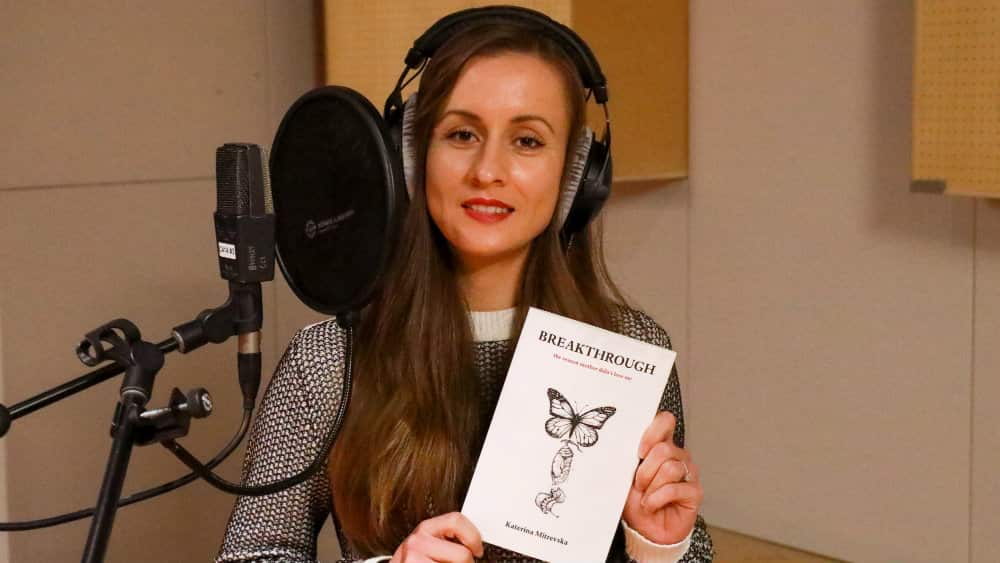Imagine being a child, and not getting any motherly attention. To have never had a mother-daughter conversation, family outings, travels or a motherly touch. Imagine being a young soul, having a mother, yet feeling so estranged from the parent who is supposed to carry you throughout your life. This is what Katerina Mitrevska says she experienced throughout her childhood.
“I had a mother, but she was never present. My father worked seven days a week so we could make ends meet. I looked after myself, my younger brother and the household. My mum was just absent, she would either sleep or just stay in bed for most of the day. She didn’t communicate much, rarely asked how the school went, rarely helped,” she says.
Ms Mitrevska says she wrote down her experiences while growing up in a Macedonian family.
“Since I can remember, I was writing essays. Those were more for self-reflection to reflect on what was happening in my life, why my mother didn’t love me and what was wrong with me.
“I had to reflect on my thoughts and emotions for myself to work out my feelings at that time, to find where I belonged,” she told SBS Macedonian.
I wished I could change whatever it was that made her so unwell. As a child, I just wanted a mother like everyone else’s.
Growing up, she remembers vividly wanting to change her mother, often asking herself what is it that she did wrong for her mother to not love her.
She says living in a society that didn’t talk about mental illness in her country meant that the family’s situation was normalised.
“My father couldn’t come to any of our school interviews as he was working all the time, but none of the teachers ever asked if everything was okay for me and my family. It felt as if it didn’t matter to anyone,” says Ms Mitrevska.
So much so that there are no family photos of everyone together.
The only photo of herself and her brother as toddlers was taken when she was a little over two-years-old and her brother Nikolche was one. It’s the only time she remembers their mother taking them out. She says her mother at times would be fighting the enemies in her head, speaking loudly and yelling words that didn’t make sense to Ms Mistrevska and scared her. She said her mother’s illness was suffocating her.
She says her mother at times would be fighting the enemies in her head, speaking loudly and yelling words that didn’t make sense to Ms Mistrevska and scared her. She said her mother’s illness was suffocating her.

Katerina Mitrevska with her brother Nikolche. Source: Katerina Mitrevska
“When you are a child, and no one tells you the reason why your mother is unwell, naturally you assume it’s because of you. There wasn’t any logical explanation."
“I wondered every day how my life would have been if my mum didn’t have this health problem.”
At one point, she says she began to feel that she could also start hearing voices like her mother.
“However, through self-reflection, I realised that I had control over my thoughts. I couldn’t change my mother’s illness, but I could change the way I reacted to the events in my life. This realisation was powerful and liberating for me."
I stopped identifying myself with my mother’s illness and was able to rise above all judgment and prejudice and chose to change my life and improve my family’s quality of life.

Katerina Mitrevska and her husband Source: Katerina Mitrevska
She remembers going to the hospital with her father and being in total shock and distress from the state of the place and the people who were hospitalised. She immediately decided against institutionalising her mother.
“I just couldn’t do it, that was not the life I wanted for my mother. We lived in a very challenging situation but I couldn’t just give up on her.”
Her mother didn’t have a correct diagnosis until Ms Mistrevska was a young adult. Having those words written on a piece of paper meant the suffering had a name: Schizophrenia. She says it wasn’t anyone’s fault, but the pain and suffering were implications of the community’s ignorance of mental health issues.
With the desire to improve her mother’s quality of life, she decides to enrol in a medical high school and later with help from relatives living in Australia she continued her studies in Melbourne. She says with her new attitude towards her mother and the medical treatment, her mental health showed remarkable improvement.
She says with her new attitude towards her mother and the medical treatment, her mental health showed remarkable improvement.

Author of 'Breakthrough - the reason mother didn't love me', Katerina Mitrevska, recording her debut poetry collection. Source: Katerina Mitrevska
“Since I was able to let go of my grudge and continuously helped, hugged and supported my mum and she started improving. It became obvious to me that she needed support, acknowledgement and emotional security.
“I truly believe those small acts of affection helped her gain courage and trust and see me as a friend rather than as a stranger or enemy. She started taking her monthly injections and as she gained more and more sense of herself, she reached out for more help.
Although there were moments when I thought that it might never be possible, I have regained my mother.
“My mother’s illness challenged our relationship. It challenged my sense of existence. It wasn’t until I grew older that I was able to look beyond the illness and see my mother for who she is. This process was painful and uncomfortable and it nearly broke me. However, my love, hope and faith for a better tomorrow helped get to the other side of it.”
"And although she is much better now and we talk every week, we still haven’t had a chance to take our family photo. I am looking forward to the day when we get to have our family dinners and holidays.”
Ms Mistrevska is now working as an administrative assistant at St. Vincent’s Hospital Health Independence Program Central Intake. Her book ‘Breakthrough – The reason mother didn’t love me’ is a compilation of her poems that she wrote on her childhood experiences, was released recently.
Information on looking after your mental health during the coronavirus outbreak is available at .
Readers seeking further support can contact Lifeline crisis support on 13 11 14, Suicide Call Back Service on 1300 659 467 and Kids Helpline on 1800 55 1800 (for young people aged 5 to 25). supports people from culturally and linguistically diverse backgrounds.
You can also access help via
